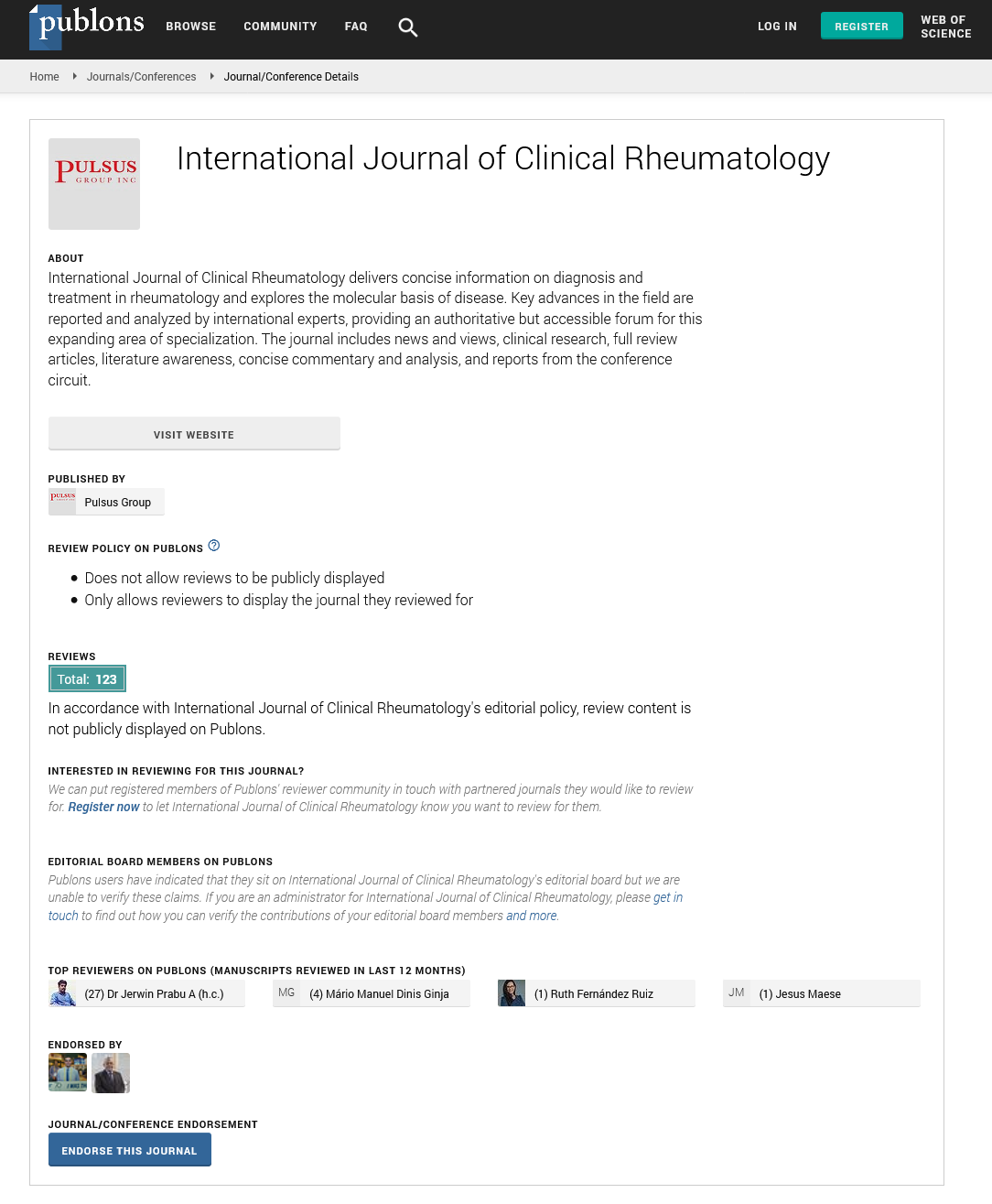Review Article - International Journal of Clinical Rheumatology (2024) Volume 19, Issue 8
A Review of Current and Future Technologies Enhancing Patient Care in Rheumatology
Yasser El Dershaby*
Vice President and Regional Medical Lead, Pfizer Inc., United Arab Emirates
- *Corresponding Author:
- Yasser El Dershaby
Vice President and Regional Medical Lead, Pfizer Inc., United Arab Emirates
E-mail: dershaby@googlemail.com
Received: 08-Aug-2024, Manuscript No. fmijcr-24-144974; Editor assigned: 10- Aug-2024, Pre-QC No. fmijcr-24-144974 (PQ); Reviewed: 24-Aug-2024, QC No. fmijcr-24-144974; Revised: 29-Aug-2024, Manuscript No. fmijcr-24-144974 (R); Published: 02-Sep-2024, DOI: 10.37532/1758- 4272.2024.19(8).194-199
Abstract
Advancements in healthcare technology are revolutionizing clinical rheumatology, offering substantial opportunities to enhance patient care and outcomes. This article examines the role of electronic health records (EHRs), remote management of rheumatoid arthritis (RA) through telehealth and mobile health (mHealth) technologies, blockchain for data privacy, and innovative wearable devices. These technologies significantly improve data management, patient monitoring, and overall care coordination. Despite challenges in interoperability, data accuracy, cybersecurity, regulatory compliance, and patient engagement, technology itself presents robust solutions. Blockchain technology, in particular, offers enhancements in data privacy and security, interoperability, and patient adherence. The integration of these advanced technologies promises a transformative impact on rheumatology, advocating for their adoption in clinical practice to improve patient outcomes.
Introduction
In recent years, advancements in healthcare technology have revolutionized the field of clinical rheumatology, offering promising opportunities to enhance patient care and outcomes. This article explores the impact of electronic health records (EHRs), remote management of chronic conditions like rheumatoid arthritis (RA), blockchain technology for data privacy, and innovative wearable devices. These technologies are not only transforming how rheumatologists practice but also improving the quality of life for patients with chronic rheumatic diseases. Technology plays a crucial role in managing rheumatic chronic conditions due to the complex and often fluctuating nature of these diseases. Patients with conditions such as RA require continuous monitoring, frequent adjustments in treatment, and comprehensive care coordination. Advanced technologies facilitate real-time data collection, remote monitoring, and efficient communication between patients and healthcare providers. This continuous and detailed oversight is essential for timely interventions, preventing disease progression, and enhancing the overall quality of life for patients. Furthermore, technology empowers patients by providing tools for self-management, increasing their engagement and adherence to treatment plans. Thus, integrating technology into rheumatology practice is vital for addressing the unique challenges of managing chronic rheumatic conditions effectively.
Recent studies over the past five years have highlighted the transformative potential of technology in the field of rheumatology. Artificial intelligence (AI) has been identified as a powerful tool for improving diagnostic accuracy and personalizing treatment plans. Integrating AI with existing healthcare systems could enhance clinical decision-making and patient outcomes [1]. Telemedicine has emerged as a significant advancement, offering increased access to care and better patient engagement, though challenges such as technology adoption and data security remain [2]. Wearable technology has demonstrated potential in providing real-time data for managing rheumatic diseases, yet issues with device accuracy and integration into clinical workflows need further attention [3]. Digital health tools are effectively capturing patient-reported outcomes and tailoring treatment strategies, but ongoing developments are necessary to optimize their use in clinical practice [4]. Additionally, the application of big data and machine learning is revolutionizing disease understanding and treatment personalization; although challenges related to data privacy and algorithm development must be addressed [5]. Collectively, these studies underscore the rapid advancements and ongoing challenges in integrating technology into rheumatology practice.
Electronic health records: enhancing data management and patient care
Electronic health records (EHRs) have emerged as a fundamental component of contemporary healthcare, offering a comprehensive digital infrastructure for the management of patient information. In the realm of rheumatology, EHRs confer several notable advantages:
Improved accessibility and coordination: EHRs facilitate the seamless exchange of patient data among healthcare providers, ensuring that rheumatologists have access to complete and current patient histories. This capability significantly enhances care coordination, particularly for patients with intricate conditions such as rheumatoid arthritis (RA), who frequently require multidisciplinary management.
Enhanced clinical decision-making: The incorporation of clinical decision support systems (CDSS) within EHRs provides rheumatologists with access to evidence-based guidelines and real-time alerts, thereby supporting accurate diagnosis and effective treatment planning. This is especially critical in the management of RA, where prompt intervention is essential to avert joint damage and subsequent disability.
Data analytics and population health management: EHRs facilitate the aggregation and analysis of extensive datasets, enabling rheumatologists to identify patterns, monitor clinical outcomes, and implement population health strategies. These capabilities can significantly enhance the management of RA at both the individual patient and broader community levels, promoting more effective and tailored healthcare interventions.
Remote management of chronic conditions: telehealth and mobile health technologies
The COVID-19 pandemic has significantly accelerated the adoption of telehealth and mobile health (mHealth) technologies, offering innovative solutions for the remote management of chronic conditions such as rheumatoid arthritis (RA). At Pfizer, we have implemented several of these programs with notable success, particularly in countries where healthcare facilities are predominantly centralized in capitals and major cities.
- Telehealth: Telehealth platforms enable virtual consultations, allowing rheumatologists to monitor and manage RA patients remotely. This approach is especially beneficial for patients in rural or underserved regions, where access to specialist care may be limited. By facilitating more frequent monitoring, telehealth can lead to the earlier detection of disease flares and timely adjustments in treatment regimens. Our programs have demonstrated that telehealth can effectively bridge the gap between patients and healthcare providers, ensuring continuous and comprehensive care.
- Mobile health applications: mHealth apps designed specifically for RA patients can monitor symptoms, medication adherence, and physical activity. These apps typically include patient education resources and communication tools, enhancing patient engagement and promoting self-management. Rheumatologists can leverage data from these apps to tailor treatment plans and deliver personalized care. Our initiatives have shown that mHealth applications not only empower patients to actively participate in their health management but also provide valuable insights for clinicians to optimize therapeutic strategies [6].
These advancements underscore the potential of telehealth and mHealth technologies to transform the management of chronic rheumatic conditions, improving accessibility and quality of care for RA patients worldwide.
Challenges facing advanced technology in rheumatology
Despite the promising advancements in healthcare technology, there are several challenges that hinder the full realization of their potential, particularly in the context of managing rheumatology patients. These challenges span technical, regulatory, economic, and patient-related dimensions [7].
Technical challenges
- Interoperability: One of the primary technical hurdles is achieving seamless interoperability between different health information systems. Rheumatology patients often receive care from multiple specialists and healthcare providers, necessitating the integration of diverse electronic health record (EHR) systems. Disparate systems can result in fragmented data, hindering comprehensive patient management.
- Data accuracy and quality: The effectiveness of technologies such as EHRs and mobile health (mHealth) applications relies heavily on the accuracy and quality of the data entered. Inaccurate or incomplete data can lead to misdiagnosis, inappropriate treatment plans, and overall suboptimal patient outcomes.
- Cybersecurity and data privacy: The increasing use of digital health technologies raises significant concerns about cybersecurity and data privacy. Rheumatology patients' sensitive health information must be protected from cyber threats and unauthorized access. Ensuring robust security measures while maintaining ease of access for authorized users is a critical challenge.
Regulatory and compliance issues
- Regulatory approvals: Advanced technologies, especially those involving telehealth and mHealth applications, often require regulatory approvals before widespread adoption. Navigating the complex and varying regulatory landscapes across different countries can be time-consuming and costly, potentially delaying the implementation of beneficial technologies.
- Compliance with data protection laws: Stringent data protection laws, such as the General Data Protection Regulation (GDPR) in Europe, impose strict requirements on how patient data is handled. Ensuring compliance with these laws while leveraging advanced technologies can be challenging, particularly for multinational healthcare providers.
Economic barriers
- Cost of implementation: The initial cost of implementing advanced technologies such as EHR systems, telehealth platforms, and wearable devices can be prohibitive for some healthcare providers. Smaller clinics and practices, in particular, may struggle to afford the necessary infrastructure and ongoing maintenance.
- Reimbursement policies: In many regions, reimbursement policies for telehealth services and other digital health interventions are still evolving. Unclear or restrictive reimbursement frameworks can discourage healthcare providers from adopting these technologies, limiting their availability to patients.
Patient-related challenges
- Digital literacy and accessibility: Not all patients possess the digital literacy required to effectively use telehealth platforms or mHealth applications. This digital divide can result in disparities in access to advanced healthcare technologies, particularly among older adults and socioeconomically disadvantaged populations.
- Acceptance and trust: Patients may be hesitant to adopt new technologies due to concerns about data privacy, the reliability of remote monitoring, and the perceived impersonal nature of virtual consultations. Building trust and ensuring that patients understand the benefits of these technologies is essential for widespread acceptance.
- Adherence to remote monitoring: Ensuring patient adherence to remote monitoring protocols can be challenging. Patients with chronic conditions like rheumatoid arthritis may struggle to consistently use wearable devices or update symptom-tracking apps, which can impact the effectiveness of remote management strategies.
Specific challenges for rheumatology patients
- Complexity of RA management: Rheumatoid arthritis is a complex, multi-faceted condition that requires ongoing, personalized management. Advanced technologies must be sophisticated enough to handle this complexity and provide actionable insights to rheumatologists and patients.
- Disease variability: RA symptoms and disease activity can vary widely among patients and over time. Technologies need to be adaptable and capable of capturing this variability to provide accurate monitoring and effective interventions.
- Integration with existing care models: Incorporating advanced technologies into existing care models can be challenging. Rheumatologists and healthcare providers must balance the use of new tools with traditional care practices, ensuring that technology enhances rather than disrupts patient care.
- Blockchain technology: a solution for overcoming challenges in rheumatology Block chain technology has emerged as a transformative solution that can address many of the challenges faced in the adoption and implementation of advanced healthcare technologies, particularly in the field of rheumatology. By offering robust solutions for data security, interoperability, and patient engagement, block chain can significantly enhance the management of chronic conditions like rheumatoid arthritis (RA).
Enhancing data security and privacy
- Immutable and decentralized data storage: Block chain’s decentralized architecture ensures that patient data is not stored in a single, vulnerable location but is distributed across multiple nodes. Each transaction or update is encrypted and linked to the previous one, creating an immutable record that is highly resistant to tampering and unauthorized access. This can alleviate concerns about cybersecurity and data breaches, providing patients and healthcare providers with greater confidence in the security of their health information.
- Patient-controlled data access: Blockchain enables patients to have greater control over their health data through the use of private keys. Patients can grant or revoke access to their data as needed, ensuring that only authorized individuals can view or modify their records. This enhances data privacy and aligns with stringent data protection laws such as the General Data Protection Regulation (GDPR).
Improving interoperability
- Standardized data exchange: Blockchain can facilitate standardized data exchange between disparate electronic health record (EHR) systems. By creating a common framework for data interoperability, blockchain ensures that patient information can be seamlessly shared across different healthcare providers and platforms. This is particularly beneficial for rheumatology patients, who often require coordinated care from multiple specialists.
- Smart contracts for automated processes: Blockchain utilizes smart contracts—self-executing contracts with the terms of the agreement directly written into code. In healthcare, smart contracts can automate various administrative processes, such as patient consent management and insurance claims processing. This reduces administrative burdens and ensures that data sharing and other transactions are conducted transparently and efficiently.
Addressing economic barriers
Cost-effective data management: By reducing the need for intermediaries and simplifying administrative processes, block chain can lower the overall costs associated with data management. This can make advanced technologies more accessible to smaller clinics and practices, which may have previously struggled with the financial burden of implementing EHR systems and other digital health tools.
Streamlined reimbursement: Block chain can enhance the efficiency and transparency of reimbursement processes. Smart contracts can automate the submission and approval of insurance claims, reducing delays and ensuring that healthcare providers are reimbursed promptly for telehealth services and other digital health interventions. This can incentivize the adoption of advanced technologies by providing clearer and more reliable reimbursement frameworks.
Enhancing patient engagement and adherence
- Transparent and trustworthy data handling: Block chain’s transparent and immutable nature can build trust among patients, addressing concerns about data privacy and the reliability of remote monitoring. When patients are assured that their data is handled securely and transparently, they are more likely to engage with telehealth platforms and mobile health (mHealth) applications.
- Incentivizing adherence: Blockchain can support innovative models for incentivizing patient adherence to remote monitoring and self-management protocols. For example, blockchain-based systems can track and reward patients for consistent use of wearable devices and symptom-tracking apps, encouraging better adherence and engagement in their own healthcare.
Specific benefits for rheumatology patients
- Comprehensive and continuous monitoring: Blockchain can facilitate the integration of data from various sources, including EHRs, wearable devices, and mHealth applications, into a single, comprehensive patient record. This holistic view of patient health is particularly valuable for managing rheumatoid arthritis, where continuous and detailed monitoring is essential for effective disease management.
- Personalized and adaptive care: With secure and interoperable data, rheumatologists can access real-time insights and historical data to personalize treatment plans and adapt interventions based on individual patient needs. This level of personalized care can lead to better management of RA and improved patient outcomes.
Conclusion
The integration of advanced healthcare technologies into clinical rheumatology presents a promising frontier for improving patient outcomes, despite the numerous challenges that exist. Technologies such as electronic health records (EHRs), telehealth, mobile health (mHealth) applications, blockchain, and wearable devices offer transformative solutions for managing chronic conditions like rheumatoid arthritis (RA). These innovations enhance data management, patient monitoring, and overall care coordination, making it possible to deliver more personalized and effective treatments. Electronic health records streamline data management, improving accessibility and coordination among healthcare providers, and offering sophisticated tools for clinical decision-making and population health management. Telehealth and mHealth technologies enable remote monitoring and management of RA, particularly benefiting patients in rural or underserved areas by providing continuous, accessible care. Blockchain technology addresses critical concerns related to data security, interoperability, and patient engagement, providing a robust framework for protecting patient information and ensuring seamless data exchange. Despite the challenges of interoperability, data accuracy, cybersecurity, regulatory compliance, and patient engagement, technology itself offers solutions to these hurdles. Blockchain, in particular, stands out by enhancing data privacy and security, facilitating standardized data exchange, and incentivizing patient adherence through transparent and secure data handling. The advancements in healthcare technology hold significant promise for the future of rheumatology. As these technologies continue to evolve and improve, they will increasingly enable rheumatologists to provide high-quality, patient-centered care. Embracing these innovations will be essential for overcoming the current challenges and maximizing the potential benefits for RA patients. Consequently, new rheumatologists should actively seek to incorporate these technologies into their clinical practice to advance patient outcomes and stay at the forefront of medical care.
References
- Tana J, Kettunen J, Minet L et al. Telemonitoring of patients with chronic heart failure: The views of health-care professionals. Journal of Medical Internet Research. 15, 88 (2013).
- Subramaniyaswamy V, Vijayakumar V, Indragandhi V et al. A comprehensive review on wearable sensors: State-of-the-art and future trends. Sensors. 24, 1510 (2023).
- McMurrayJV, Packer M, DesaiAS et al. Angiotensin–neprilysin inhibition versus enalapril in heart failure. The New England Journal of Medicine. 371, 993-1004 (2017).
- Zhang X, Liu Q, Wang X et al. Blockchain-based medical data sharing framework for data management in the healthcare system. Journal of Medical Internet Research. 24, 33769 (2022).
- Maddison R, Rawstorn JC, Stewart AH et al. Effects and costs of real-time cardiac telerehabilitation: Randomised controlled non-inferiority trial. Heart. 103, 893-901 (2017).
- Lee S, Jung J, Shin H et al. An evaluation of telehealth for chronic disease management: Patient perspectives and health outcomes. Journal of Clinical Medicine. 10, 5006 (2021).
- Park J, Choi S, Lee J The effect of blockchain technology on the healthcare industry: A review and perspective. Applied Sciences. 9, 1736 (2019).
Indexed at, Google Scholar, Crossref
Indexed at, Google Scholar, Crossref


